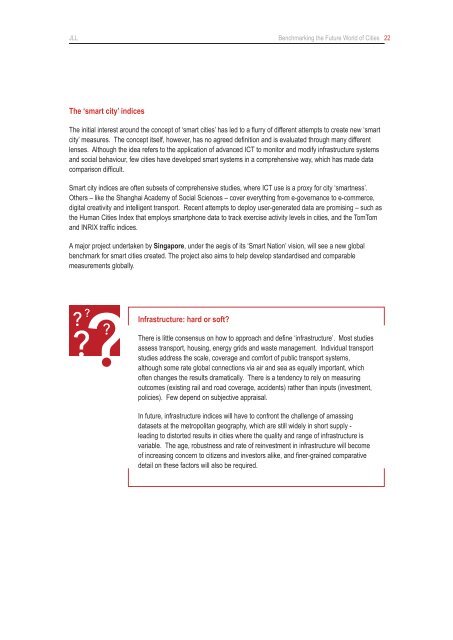Benchmarking the Future World of Cities
jll-business-of-cities-report-april-2016
jll-business-of-cities-report-april-2016
You also want an ePaper? Increase the reach of your titles
YUMPU automatically turns print PDFs into web optimized ePapers that Google loves.
JLL <strong>Benchmarking</strong> <strong>the</strong> <strong>Future</strong> <strong>World</strong> <strong>of</strong> <strong>Cities</strong> 22<br />
The ‘smart city’ indices<br />
The initial interest around <strong>the</strong> concept <strong>of</strong> ‘smart cities’ has led to a flurry <strong>of</strong> different attempts to create new ‘smart<br />
city’ measures. The concept itself, however, has no agreed definition and is evaluated through many different<br />
lenses. Although <strong>the</strong> idea refers to <strong>the</strong> application <strong>of</strong> advanced ICT to monitor and modify infrastructure systems<br />
and social behaviour, few cities have developed smart systems in a comprehensive way, which has made data<br />
comparison difficult.<br />
Smart city indices are <strong>of</strong>ten subsets <strong>of</strong> comprehensive studies, where ICT use is a proxy for city ‘smartness’.<br />
O<strong>the</strong>rs – like <strong>the</strong> Shanghai Academy <strong>of</strong> Social Sciences – cover everything from e-governance to e-commerce,<br />
digital creativity and intelligent transport. Recent attempts to deploy user-generated data are promising – such as<br />
<strong>the</strong> Human <strong>Cities</strong> Index that employs smartphone data to track exercise activity levels in cities, and <strong>the</strong> TomTom<br />
and INRIX traffic indices.<br />
A major project undertaken by Singapore, under <strong>the</strong> aegis <strong>of</strong> its ‘Smart Nation’ vision, will see a new global<br />
benchmark for smart cities created. The project also aims to help develop standardised and comparable<br />
measurements globally.<br />
Infrastructure: hard or s<strong>of</strong>t?<br />
There is little consensus on how to approach and define ‘infrastructure’. Most studies<br />
assess transport, housing, energy grids and waste management. Individual transport<br />
studies address <strong>the</strong> scale, coverage and comfort <strong>of</strong> public transport systems,<br />
although some rate global connections via air and sea as equally important, which<br />
<strong>of</strong>ten changes <strong>the</strong> results dramatically. There is a tendency to rely on measuring<br />
outcomes (existing rail and road coverage, accidents) ra<strong>the</strong>r than inputs (investment,<br />
policies). Few depend on subjective appraisal.<br />
In future, infrastructure indices will have to confront <strong>the</strong> challenge <strong>of</strong> amassing<br />
datasets at <strong>the</strong> metropolitan geography, which are still widely in short supply -<br />
leading to distorted results in cities where <strong>the</strong> quality and range <strong>of</strong> infrastructure is<br />
variable. The age, robustness and rate <strong>of</strong> reinvestment in infrastructure will become<br />
<strong>of</strong> increasing concern to citizens and investors alike, and finer-grained comparative<br />
detail on <strong>the</strong>se factors will also be required.


